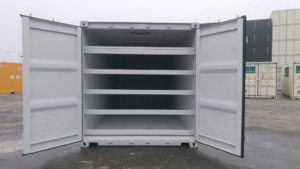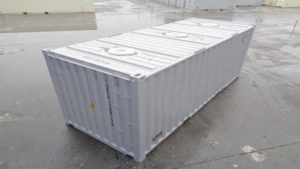はじめに
Bulk shipping containers play a crucial role in the global trade and transportation of goods. These large containers are used to transport a wide range of products, from raw materials to finished goods, across the world’s oceans. While bulk cargo containers have significantly contributed to the efficiency of international trade, it is important to examine their environmental impact. This article will delve into the implications of bulk shipping containers on the environment, exploring various aspects such as fuel consumption, emissions, and waste generation.
Fuel Consumption and Emissions
They are typically transported by large cargo vessels, which are powered by heavy fuel oil. The sheer size and weight of these vessels necessitate substantial fuel consumption, leading to significant emissions of greenhouse gases and other pollutants. The combustion of heavy fuel oil releases carbon dioxide (CO2), sulfur oxides (SOx), nitrogen oxides (NOx), and particulate matter into the atmosphere, contributing to air pollution and climate change. Furthermore, the use of heavy fuel oil by cargo vessels has been linked to harmful effects on marine ecosystems, including the release of hazardous substances into the water.

The environmental impact of fuel consumption and emissions from bulk shipping containers extends beyond air and water pollution. The transportation of goods via cargo vessels also results in noise pollution, which can disturb marine life and ecosystems. Moreover, the shipping industry is one of the largest emitters of greenhouse gases globally, making it a significant contributor to climate change. As such, the reliance on bulk cargo containers for transporting goods raises concerns about its long-term environmental implications.
Waste Generation
In addition to fuel consumption and emissions, the operation of bulk shipping containers gives rise to waste generation along the supply chain. Packaging materials, such as pallets, cardboard, and plastic wrapping, are commonly used to secure goods within the containers. While these materials are essential for safeguarding the products during transit, they contribute to the overall waste generated by the shipping industry. Improper disposal of packaging waste can result in environmental contamination, particularly in coastal areas and port facilities.
Furthermore, the maintenance of bulk cargo containers and cargo vessels generates a significant amount of waste, including lubricants, paints, and chemicals. Improper handling and disposal of these hazardous materials can pose risks to both marine and terrestrial environments, potentially causing soil and water contamination. As such, the growing volume of waste generated by the shipping industry underscores the need for sustainable waste management practices and regulatory measures to mitigate its environmental impact.

Efforts Towards Sustainability
Recognizing the environmental challenges posed by bulk shipping containers, there is a growing emphasis on sustainability within the maritime industry. Initiatives aimed at reducing fuel consumption and emissions have gained traction, with the adoption of cleaner propulsion technologies and the implementation of energy-efficient practices. For instance, some cargo vessels are exploring alternative fuel sources, such as liquefied natural gas (LNG) and biofuels, to lower their carbon footprint and minimize air pollution.
Moreover, advancements in vessel design and engineering have led to the development of more eco-friendly bulk shipping containers and cargo vessels. Innovations such as streamlined hull designs, advanced propulsion systems, and improved waste management solutions are being integrated to enhance the environmental performance of the shipping industry. Additionally, digital technologies and data analytics are being employed to optimize route planning and operational efficiency, thereby reducing fuel consumption and emissions during voyages.
Regulatory Framework and Industry Collaboration
The environmental impact of bulk shipping containers has prompted governments and international organizations to establish regulatory frameworks addressing maritime emissions and waste management. The International Maritime Organization (IMO) has introduced regulations such as the International Convention for the Prevention of Pollution from Ships (MARPOL) to limit air and water pollution from cargo vessels. These regulations set standards for fuel quality, emission control areas, and the treatment of ballast water, aiming to mitigate the environmental impact of shipping activities.
Furthermore, industry collaboration and partnerships are playing a pivotal role in driving sustainability efforts within the maritime sector. Stakeholders across the supply chain, including shipping companies, port authorities, and cargo owners, are working together to promote sustainable practices and reduce the environmental footprint of bulk shipping containers. Collaborative initiatives focusing on container optimization, modal shift to greener transport modes, and the development of eco-friendly port infrastructure are reshaping the landscape of maritime logistics towards greater environmental stewardship.
結論
In conclusion, the environmental impact of bulk shipping containers encompasses various dimensions, ranging from fuel consumption and emissions to waste generation and regulatory frameworks. While the shipping industry plays a vital role in facilitating global trade, it is imperative to address the environmental challenges associated with it. Sustainable practices, technological innovations, and regulatory measures are pivotal in mitigating the environmental impact of cargo vessels and advancing towards a more eco-friendly maritime industry. By embracing responsible environmental stewardship, stakeholders can work towards ensuring that the use of bulk cargo containers aligns with the principles of sustainability and conservation, thereby minimizing its adverse effects on the environment.
CIMC Yang Zhou Base is a leading manufacturer of bulk shipping containers and various other standard and special logistics equipment. With years of experience in the industry, it focuses on the design, production and distribution of high-quality innovative products that meet the specific needs of customers.
冷蔵コンテナ、コールドチェーン設備、コンテナ型設備統合、モジュール式建物など、高品質で革新的な物流設備が必要な場合、 CIMC Yang Zhou Base はあなたの最良の選択です。世界中のお客様からのお問い合わせを歓迎し、あなたと協力する機会を楽しみにしています。


